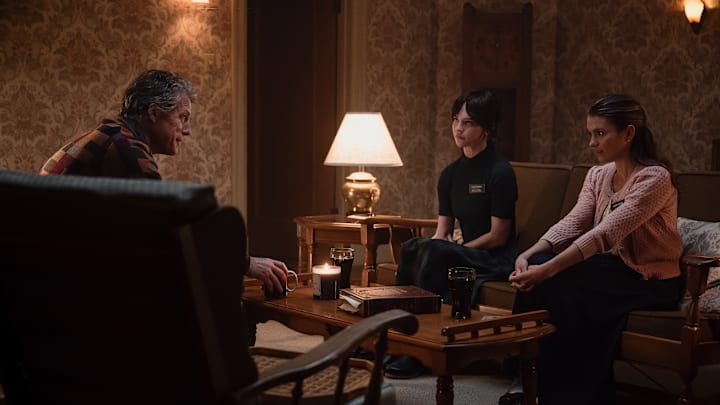Sister Barnes (Sophie Thatcher) and Sister Paxton (Chloe East) are used to rejection. They're always out stumping for the Church of Jesus Christ of Latter-day Saints, trying to get new converts. More often than not, they just run into folks who give them the cold shoulder. That's what made their encounter with Mr. Reed (Hugh Grant) so pleasantly surprising. As he answered the door for the duo, he expressed genuine enthusiasm for their religion and learning more. Reassuring them his shy wife was in the kitchen (Barnes and Paxton cannot stay in a room alone with a man, per their doctrine), Reed invites these ladies inside to talk more about Mormonism.
Initially, Heretic frames their exchanges as pleasant, if occasionally awkward as Mr. Reed asks them various questions ranging from religious inquiries to fast food preferences. However, things quickly become ominous once Barnes realizes Reed isn’t being entirely truthful. An attempt to exit the house only heightens their terror as they discover the door is bolted shut. Turns out Reed had an ulterior motive for asking these two to come inside. He isn’t interested in hearing about Mormonism. He wants to challenge Barnes and Paxton and their faith.
Under the creative impulses of writer/directors Scott Beck and Bryan Woods, Heretic is a profoundly dialogue-driven affair. Much of the film concerns Reed monologuing about his religious concepts or engaging in elaborate metaphors concerning theology. In the latter category, Beck and Woods repeatedly go back to the well of having Chris Bacon's score ratchet up in intensity only for Reed to suddenly inquire about McDonald's or Monopoly in Grant's dulcet British voice. It's a juxtaposition on top of juxtaposition here. It’s not just that more "mundane" questions get propped alongside a "chilling" set-up. Beck and Woods are also having cheeky fun with having Grant reference, in the most proper English voice possible, 90s pop culture staples like Radiohead and Jar-Jar Binks.
There’s amusingly dark fun in these chatterbox sequences, especially since Grant is truly terrific in his Heretic performance. However, so much of the runtime consisting of endless exposition or theories from Mr. Reed does put the proceedings into a repetitive rut. Remember when Quinta Brunson declared she didn't want the Abbott Elementary characters to sound like they were regurgitating people’s Twitter timelines? Heretic, unfortunately, runs into a problem where it often just sounds like religious rants cribbed from social media. That’s partially the point, but even a compelling Grant turn can’t make such verbiage 110% absorbing.
Beck and Woods are clearly deeply enamored with turning Clive Durham/Daniel Cleaver/William Thacker into a reflection of a modern monster more terrifying than any slasher villain: dudes desperate to get women to debate them. Unfortunately, this narrative emphasis leaves Barnes and Paxton thinly defined as lead characters. Too often they’re just silent, wide-eyed background audience members to a Mr. Reed symposium. By the time the third act rolls around, their only role in the plot is to deliver exposition explaining to the audience what Reed’s ultimate plan and machinations are. Compare this to something like Red Rocket, which featured a visual motif where the camera zoomed in on women’s faces whenever the film’s repellant male protagonist started blabbering about “immigrants” or the opposite sex. The camera’s focus remained on the marginalized.
Such creative visuals elude Heretic in its dialogue-heavy impulses. Despite all these grievances, though, Beck and Woods do still create a largely decent horror film in their latest directorial outing. It certainly helps that, while there’s too much of a good thing vis-à-vis Mr. Reed’s ramblings, Hugh Grant truly is tremendous in his on-screen performance. In recent years, Grant’s taken a shine to playing slimeballs in projects ranging from Paddington 2 to Dungeons & Dragons: Honor Among Thieves. Heretic’s intimate scope allows Grant’s natural charisma to really shine through and take on new level of creepiness. The way he maintains a grin and surface-level British pleasantness even as Mr. Reed does the most despicable things is an unnerving sight that Grant pulls off with finesse.
Heretic's sound department also leaves an impression during the film's runtime. Artists like foley recordist Gareth Baird create a series of noises for Mr. Reed’s house that simultaneously function as eerie and also just the kind of thing you’d hear in an older man’s domicile. A little wooden pipe creaking up and down as it deposits rainwater, for instance, can often be heard in the very back of various scenes. It’s just the kind of thing someone one would have in a boring office. Within these chilling confines, though, that noise works nicely here accentuating an uneasy atmosphere. Coming from off-screen, that creaking almost sounds like a clock ominously ticking away the few hours our protagonists have left.
The squeaking of floorboards, the crackling of matches getting desperately lit, or gears turning inside a little box also register as deeply distinctive thanks to this sound team. These noises and committed performances from Thatcher and East really anchor the most suspenseful Heretic sequences. Especially engaging is a lengthy set-piece where our heroes try to secure matches lying on the floor of another room. Though a flawed feature, Heretic has its fair share of nail-biter scenes that’ll satisfy many horror fans.
Unfortunately, those greater virtues are undercut by some clumsy visual impulses. Specifically, ham-fisted insert shots too obviously establishing various Chekhov’s Guns that prove important to the third act. Between that foible and a heavy reliance on Grant reading this film’s themes aloud, Heretic was just too heavy-handed for my taste. This is a competently crafted feature buoyed by three talented actors (Grant especially excelling in this role). However, the best horror leaves something to the imagination and leans into the inexplicable chaos of the world. Heretic, unfortunately, is plagued by sins like an overt affection for excessive monologues and predictable pay-offs.
